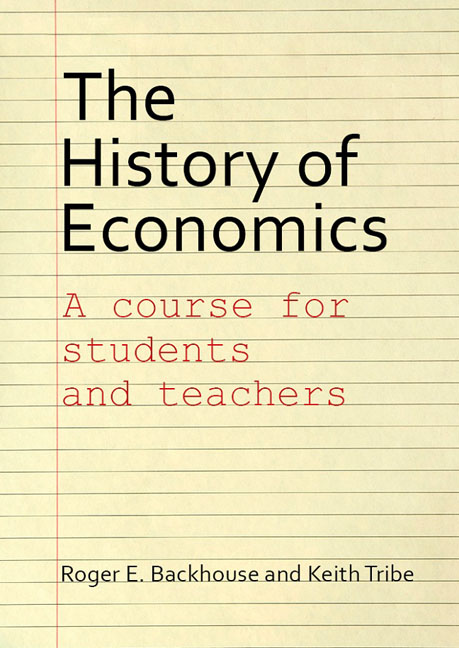Book contents
- Frontmatter
- Contents
- Introduction
- Lecture 1 Commerce, Wealth and Power: The Disputed Foundations of the Strength of a Nation
- Lecture 2 Natural Order, Physiocracy and Reform
- Lecture 3 Adam Smith I: Outline of a Project
- Lecture 4 Adam Smith II: The Two Texts
- Lecture 5 The Political Economy of Malthus and Ricardo
- Lecture 6 Political Economy in Continental Europe and the United States
- Lecture 7 Political Economy, Philosophic Radicalism and John Stuart Mill
- Lecture 8 Popular Political Economy: List, Carey, Bastiat and George
- Lecture 9 Radical Political Economy: Marx and His Sources
- Lecture 10 Marginalism and Subjectivism: Jevons and Edgeworth
- Lecture 11 From Political Economy to Economics
- Lecture 12 Alfred Marshall’s Project
- Lecture 13 Markets and Welfare after Marshall
- Lecture 14 Monetary Economics
- Lecture 15 The Rise of Mathematical Economics
- Lecture 16 Robbins’s Essay and the Definition of Economics
- Lecture 17 John Maynard Keynes
- Lecture 18 Quantitative Economics
- Lecture 19 The Keynesian Revolution
- Lecture 20 Modern Macroeconomics
- Lecture 21 Inflation and the Phillips Curve
- Lecture 22 Popular Economics
- Lecture 23 Economics and Policy
- Lecture 24 Ideology and Place
- Index
Lecture 9 - Radical Political Economy: Marx and His Sources
Published online by Cambridge University Press: 09 August 2023
- Frontmatter
- Contents
- Introduction
- Lecture 1 Commerce, Wealth and Power: The Disputed Foundations of the Strength of a Nation
- Lecture 2 Natural Order, Physiocracy and Reform
- Lecture 3 Adam Smith I: Outline of a Project
- Lecture 4 Adam Smith II: The Two Texts
- Lecture 5 The Political Economy of Malthus and Ricardo
- Lecture 6 Political Economy in Continental Europe and the United States
- Lecture 7 Political Economy, Philosophic Radicalism and John Stuart Mill
- Lecture 8 Popular Political Economy: List, Carey, Bastiat and George
- Lecture 9 Radical Political Economy: Marx and His Sources
- Lecture 10 Marginalism and Subjectivism: Jevons and Edgeworth
- Lecture 11 From Political Economy to Economics
- Lecture 12 Alfred Marshall’s Project
- Lecture 13 Markets and Welfare after Marshall
- Lecture 14 Monetary Economics
- Lecture 15 The Rise of Mathematical Economics
- Lecture 16 Robbins’s Essay and the Definition of Economics
- Lecture 17 John Maynard Keynes
- Lecture 18 Quantitative Economics
- Lecture 19 The Keynesian Revolution
- Lecture 20 Modern Macroeconomics
- Lecture 21 Inflation and the Phillips Curve
- Lecture 22 Popular Economics
- Lecture 23 Economics and Policy
- Lecture 24 Ideology and Place
- Index
Summary
Aims of the lecture
1. To show how Marx used the political economy of the early nineteenth century to construct a critical history of the capitalist mode of production.
2. To make clear that Capital was not only an unfinished work, it was a work that Marx either could not finish, or no longer wished to finish.
3. To present Marx’s political economy in its contemporary context, and so excluding subsequent interpretations of his writings.
Bibliography
Marx worked by drafting and redrafting, so besides the published work there is a much larger mass of unpublished and disorderly material that has survived and been transferred into print by the editors of the current complete works, the Marx–Engels Gesamtausgabe, a project that began in the German Democratic Republic in the 1970s and is still ongoing in the Federal Republic. The volumes of the new Gesamtausgabe were very expensive when it started, and so very few libraries outside the Soviet bloc subscribed to it. However, the collapse of the GDR and unification flooded the second-hand market with surplus collections, and individual volumes published before 1990 are now therefore available quite cheaply. This edition replaced the earlier Dietz Verlag version, which was always cheap, but marred by editorial prejudice and dogmatism. The English 50-volume Collected Works is for the most part based on the Dietz edition.
There is of course a diverse mass of commentary on Marx, mostly dated and unreliable. The ongoing work of the Gesamtausgabe has breathed new life into old controversies; much of the newer specialist writing fails to engage with current standards in intellectual history. One major exception here is Peter Ghosh, “Constructing Marx in the History of Ideas”, Global Intellectual History (forthcoming), which provides a masterly overview of Marx’s intellectual career and that of his writings. The standard biography is now Gareth Stedman Jones, Karl Marx: Greatness and Illusion (London: Allen Lane, 2016). There is also a vast literature of “Marxist economics” going back to the later nineteenth century. However, most of the issues discussed at great length in such writing are constructions upon Marx’s writings by individuals seeking to develop Marx’s “insights”.
- Type
- Chapter
- Information
- The History of EconomicsA Course for Students and Teachers, pp. 137 - 152Publisher: Agenda PublishingPrint publication year: 2017



